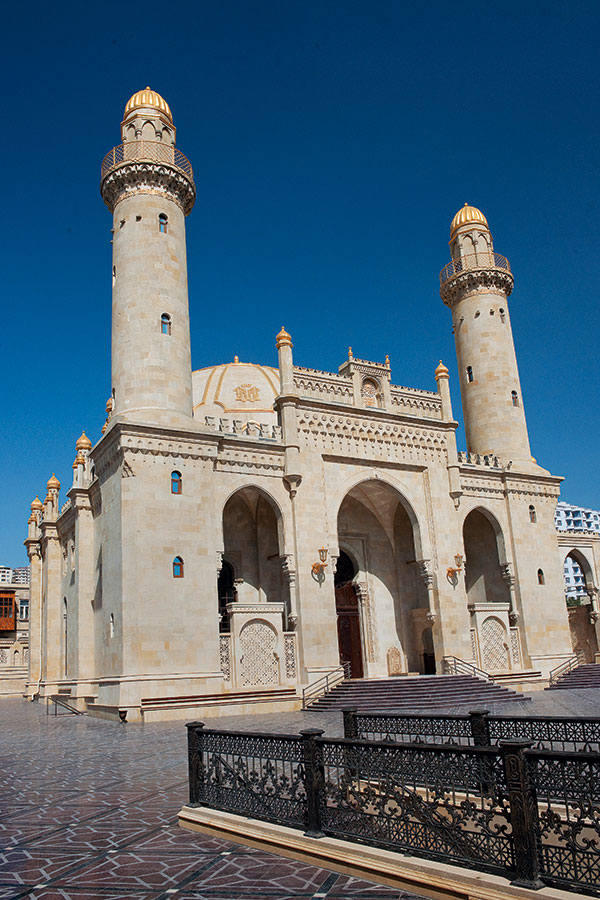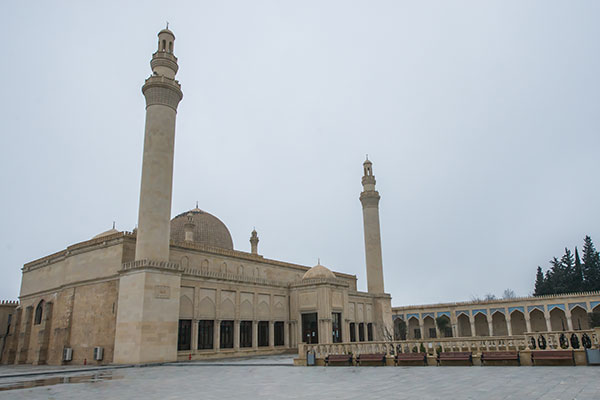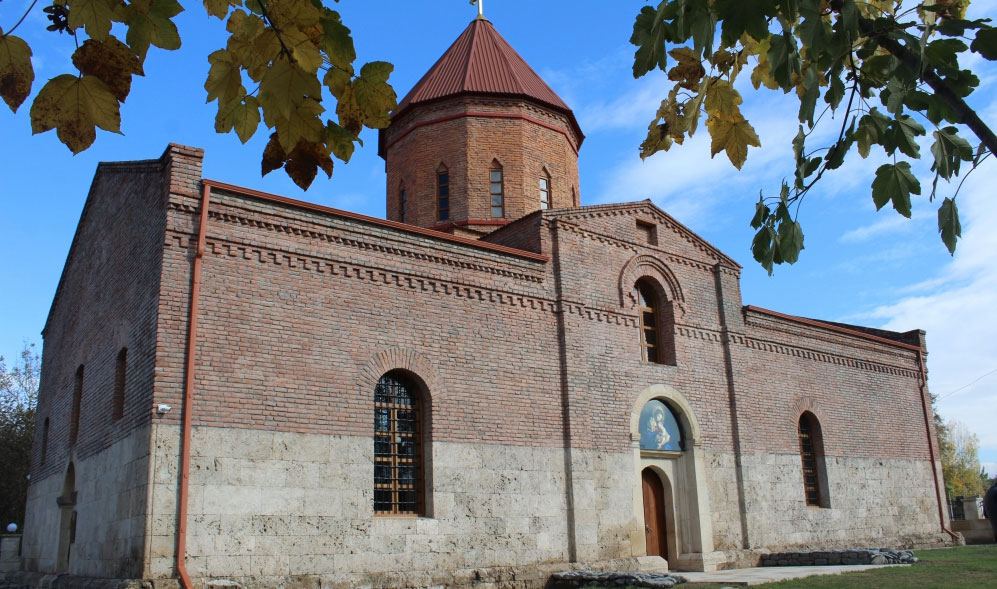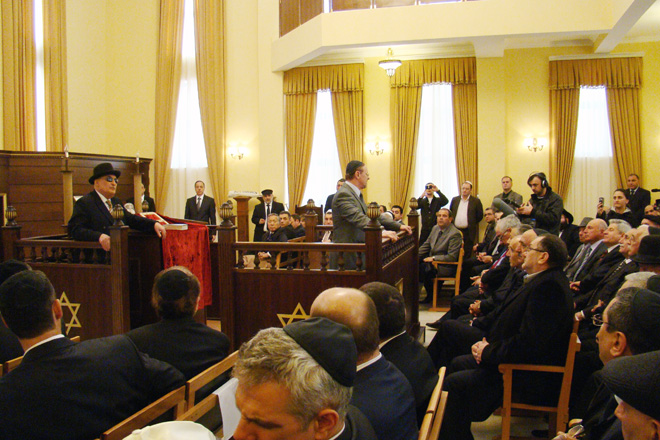RELIGIONS IN PRESENT AZERBAIJAN
The religions of Azerbaijan comprise different religious trends spread among the people and ethnic groups residing in the country. There are several confessions in Azerbaijan.
Article 48 of the Constitution of Azerbaijan ensures the liberty of worship to everyone. Everyone has a right to choose any faith, to adopt any religion or to not practice any religion, to express one's view on the religion, and to spread it. According to paragraphs 1-3 of Article 18 of the Constitution the religion acts separately from the government, each religion is equal before the law, and the propaganda of religions, abating human personality and contradicting the principles of humanism is prohibited. At the same time, the state system of education is also secular.
The law of the Republic of Azerbaijan "On freedom of faith" ensures the right of any human being to determine and express his view on religion and to execute this right.
Islam

İslam is one of the largest divine religions in the world. Although Azerbaijan is a secular country, the majority of the population is Muslim. Traditions of Islam are widespread in our country. Over the centuries, Azerbaijan has been one of the main centers of Islamic civilizations. Azerbaijanis achieved great success in the formation of Islamic culture, played a special role in terms of the spread of Islam and the establishment of the Muslim Renaissance. All of these processes contributed to the evolution and tangible and intangible heritage of Islam in the territory of Azerbaijan from the earliest times.
Today, the number of mosques is over 2,000, compared to only 17 mosques functioning in our country during the Soviet period. More than 300 of these mosques are protected as historical and cultural monuments. The policy of caring for Islamic values and Islam’s historical and religious monuments was founded by National Leader Heydar Aliyev and is successfully continued by President Ilham Aliyev today. As a result of this care, the Bibiheybat, Tazapir, Ajdarbay, and Shamakhi Juma mosques and the Imamzade complex in Ganja underwent an overhaul, and the Heydar Mosque, the most spectacular temple in the South Caucasus, was built in our capital city.
However, the sad truth is that when our territories were under occupation, hundreds of our religious monuments became the victims of Armenian vandalism over the 30 years period of time and it was humiliation against our religious monuments. After the liberation of our occupied territories, it became obviously clear that when these territories were under the occupation of Armenia, more than 60 mosques and 44 temples were destroyed in the territories where cultural cleansing and numerous war crimes were committed. Currently, the restoration of our religious and historical monuments in the liberated territories continues.
After the fall of the Soviet Empire, hundreds of new Muslim religious communities began functioning in our country, and the Caucasian Muslims Office was established on the basis of the Transcaucasian Muslim Spiritual Administration. The Muslim religious communities functioning in the Republic of Azerbaijan are united under the umbrella of this historical religious center and are subordinate to it in organizational matters.
During the period of independence, a favorable environment was created in Azerbaijan for the scientific study of Islam and the establishment of appropriate educational institutions. In 1992, the Faculty of Theology was established at Baku State University (BSU).
The relations of the state-religion are regulated by the State Committee for the Work with Religious Associations of Azerbaijan established by the decree of President Heydar Aliyev in 2001.
On February 9, 2018, the Azerbaijan Institute of Theology was founded under the State Committee for Work with Religious Organizations by the Order of the President of the Republic of Azerbaijan. The theology faculty of BSU was incorporated into the structure of the new institute. Also, secondary religious education institutions and courses within religious communities were opened in different regions of our country to teach the doctrines of Islam.

The above-mentioned facts are an indication that, in modern Azerbaijan, the state provides ample opportunities for the preservation of traditional Islamic values.
Establishing and developing relations with the Islamic world is a priority area of the foreign policy of our state. It is no coincidence that the Organization of the Islamic Conference (ed.: renamed as the Organization of Islamic Cooperation (OIC) in 2011) was the first international institution joined by Azerbaijan.
After the restoration of independence, our state was the first post-Soviet country to apply for membership of the OIC, and, consequently, Azerbaijan was admitted as a full member of the Organization of the Islamic Conference during the Sixth Islamic Conference held in Senegal’s capital Dakar on December 8, 1991. Azerbaijan was also elected as a member of the Islamic World Educational, Scientific, and Cultural Organization (ICESCO) in 1991. It should be noted here that the Organization of the Islamic Conference was the first international organization to openly condemn the Armenian aggression against Azerbaijan.
Within a short span of time, the state of Azerbaijan became an active member of the influential international Muslim organizations, OIC and ICESCO. For instance, at the initiative of our country, new entities such as the OIC Youth Forum, the OIC Labor Center, and the Journalists Association of OIC Member States have been established.
Our country`s relations with ICESCO developed more in 2006. This year, Mehriban Aliyeva who is the first vice-president of the Republic of Azerbaijan, granted the title of Goodwill Ambassador of ICESCO.
During the years, Azerbaijan cooperated with ICESCO over numerous international projects. Baku and Nakhchivan cities selected the capital cities of Islamic culture in 2009 and 2018 respectively. In 2009, Islamic countries` ministers of culture meeting, 12th session of ICESCO general conference in 2015, and Executive Department`s 36th meetings held in Baku. ICESCO is one of the main partners of the `Baku Process` which is the initiative of President Ilham Aliyev and adopted by the United Nations.
Today Azerbaijan makes great contributions to the enhancement of solidarity in the Islamic world. Our state’s efforts in this area are highly appreciated by the Muslim world. A good example of this appreciation was Baku’s announcement as the capital of Islamic culture in 2009 with the support of ICESCO, followed by the bestowment of this honorable title to Nakhchivan, another ancient city of our country, in 2018.
Among the important initiatives and measures implemented by the Azerbaijani state to establish peace and unity in the Muslim world, we can mention President Ilham Aliyev’s announcement of 2017 as the "Year of Islamic Solidarity" or the “Baku 2017” Fourth Islamic Solidarity Games held in our capital city on May 12-22, 2017.
The announcement of 2016 as the “Year of Multiculturalism” by order of Azerbaijani President Mr. Ilham Aliyev also contributed to the enhancement of Islamic solidarity. On January 15, 2016, all Muslims, regardless of their sectarian background, came together at the Heydar Mosque in Baku to perform the Friday salat (prayer) in one place. The observance of this religious ceremony called the “Salat of Unity” has great historical importance. Performance of the salat of unity in Azerbaijan — a country considered one of the main centers of tolerance and multiculturalism in the modern world — and its evolution into a traditional prayer observed also in other mosques of our country is, in fact, a message of peace and solidarity sent out by our people to the world. The fact that the salat of unity was first performed at the Heydar Mosque has a symbolic meaning. Because it was National Leader Heydar Aliyev, who raised tolerance and multiculturalism to the level of state policy in Azerbaijan. Currently, this policy is successfully continued by Azerbaijani President Ilham Aliyev.
As we can see, Azerbaijan, which has been one of the main centers of the Islamic civilization for centuries, continues to hold an important position in the Islamic world today. It is no coincidence that the green color, one of the three colors on our state flag — an important symbol of our national sovereignty — signifies the Azerbaijani people’s belonging to the Islamic civilization.
It is difficult to imagine the morality and lifestyle of the Azerbaijani people without Islamic values. The exclusive, unifying, and progressive role of Islam in the destiny of our country and the fate of our people is an undeniable historical fact. Deeply etched in the genetic memory of our people, Islam has strongly influenced Azerbaijanis’ transformation into a unified people and the formation of their national identity, statehood tradition, and culture.
Belonging to the Islamic civilization, the Azerbaijani people also uphold universal, civil, secular, tolerant, and multicultural values. In this sense, having opted for democratic, rule-of-law, and secular state-building and moving confidently towards the establishment of civil society, Azerbaijan stands out in the Islamic world for its uniqueness. Because serving as a bridge between the Eastern and Western cultures, our country makes important contributions to the development of interfaith and inter-civilization dialogue and the establishment of peace and harmony in the world and offers a unique co‑existence and exemplary multiculturalism model. Azerbaijan demonstrates a commitment to both universal and national moral values, including the high moral principles of Islam, which have played a progressive role in its history.
Christianity
Christianity is represented by Orthodoxy, Catholicism, and Protestantism as well as a number of sectarian communities in Azerbaijan. Five Armenian-Gregorian communities have been registered in the country.
Orthodoxy is currently represented by Russian and Georgian Orthodox churches in Azerbaijan. The Russian Orthodox churches that were founded in 2000 are report to the Eparchy of Baku and the Caspian region. The Russian Orthodox Church is the largest Christian confession in Azerbaijan by the number of adherents. The establishment of this church in our country dates back to the early 19th century.
 Azerbaijan also accounts for eleven Malaccan communities related to the old rituals of orthodoxy. These communities do not have any church; their dogmas are fixed in a special book of rituals. They oppose the church hierarchy which has a special power.
Azerbaijan also accounts for eleven Malaccan communities related to the old rituals of orthodoxy. These communities do not have any church; their dogmas are fixed in a special book of rituals. They oppose the church hierarchy which has a special power.
Albanian-Udi Church. Though the number of people belonging to the Albanian-Udi Christian religious community differs from that of others yet it's distinguished for its nature, content, religious and political importance. To date of 6000 of 10 000 people of the Udi ethnic community live in Azerbaijan including 4400 people compactly residing in the Nich village of Gabala district.
The udis which originated from the Turkic tribes of the fourth century B.C. resided on the territory of Karabakh and Caspian seashore, later accepted Christianity and spread this religion in the Caucasus Albania. The church of Kish (the Kish village of Sheki district)-the first Christian church-was considered the forefather of the Christian churches.
Tsarist Russia, incited by Armenians, resettling to Karabakh signed a decree which abolished the Albanian church in 1836 and transferred Albanian praying-houses, all equipment, and documents, belonging to the church to the Armenian apostolic church. Under such conditions, the udis would either accept the Gregorian religion thus turning to Armenians, or become lonely dervishes. However, they had remained truthfully devoted to their faith, traditions, and historical motherland through displaying great courage for over 180 years did not turn into Armenians on the contrary they tried to remove the historical injustice initiated from 1836. With the restoration of the Albanian-Udi Christian community, the theoretically proven historical facts were materialized and the rights of just Udis were partially restored.
Armenians, who tried to tamper with and destroy everything that reminded them of Caucasian Albania and the Albanian Apostolic Church, could not fully implement their insidious plans. After the restoration of state independence by the Azerbaijani nation, two Albanian-Udi religious communities were registered by the state: the Albanian-Udi Christian religious community of the Republic of Azerbaijan and the Albanian-Udi Christian religious community of Oghuz city.
With the support of the Government of Azerbaijan, the church of the `Yelisey Temple` which is located in the village of Kish, Sheki region and also known as the "mother of churches" in the Caucasus, was restored. In 2006, Albanian Church "Chotari" was officially opened in the Nij settlement of the Gabala region, that the only place where Udis live compactly and considered their historic Homeland. In 2020, another historical church - the holy church of Saint Maria which is located in Nij town, was thoroughly restored by Heydar Aliyev Foundation.
Furthermore, on July 14, 2013, the tradition of baptism, which had been forgotten for more than 80 years, was revived in the Albanian-Udi religious community. On August 3, 2013, a ceremony was held with state support to celebrate the 10th anniversary of the revival of the Albanian-Udi church and the 1700th anniversary of Christianity’s adoption as the official religion in Caucasian Albania. It is also a reality that the Udi people living in our country are surrounded with full attention and care by the state of Azerbaijan.
The state of Azerbaijan carries out important work aimed at studying the ancient and rich history of Caucasian Albania, discovering the real scientific and historical truths, and exposing the Armenian falsifications. Because it is confirmed by undeniable historical facts that the only successor of the magnificent tangible cultural heritage of Caucasian Albania is Azerbaijanis.
Historical Albanian churches met with their true owners after the liberation of our territories which were under occupation for almost 30 years. Each of them is visiting by community members. Rafiq Danakari who is the chairman of the Albanian Orthodox Church was appointed a preacher at the Khudavang monastery in the Kalbajar region.
Catholicism. This trend in Christianity was represented by the Roman Catholic community in Baku.
After the Azerbaijan Republic gained its independence, there were good conditions for the revival of Catholicism. On the basis of the high diplomatic relationship between the Republic of Azerbaijan and the Vatican, the catholic community is thoroughly supported with government assistance.
It should be noted that the Catholic community was first registered by the State Committee for Work with Religious Associations on January 31, 2002. The most memorable event in the history of Catholics in our country took place in May in the same year. So, Pope John Paul II made an official visit to our country, with the invitation of Heydar Aliyev. The pontiff`s visit was a new page for the fate of Catholics in Azerbaijan.
A Catholic Church was built in the center of Baku in February 2007. On 28 September 2008, the Memorandum of Understanding was signed between Heydar Aliyev Foundation and the Catholic religious community.
One of the examples which show the high diplomatic relationship between Azerbaijan and Vatican is the Pope Francis` visit to our country on 2 October 2016.
Protestantism. Currently, Protestantism is represented by different branches in our country. The following are the protestant communities registered in Azerbaijan: “New Life Christian Bible” religious community, Baku religious community of Savior Evangelical Lutherans, “Word of Life” Christian religious community, “Word of Life — 2” Christian religious community of Sumgait, “Agape” religious community of Baku Evangelical Christian Baptists, “Seventh-day Adventists” religious community of Narimanov district of Baku, “Seventh-day Adventists of Ganja city” Christian religious community, “Vineyard Azerbaijan” Christian religious community, and “Alov” (Flame) Christian religious community of Baku.
Judaism
There are three communities of Jews-Mountain Jews, Ashkenazi Jews, and Georgian Jews Azerbaijan. Nearly 16 000 Jews reside in the country. Of the 11000 people are mountain Jews, including 6000 people living in Baku and 4000 in Guba while a thousand people live in other cities. Ashkenazi Jews are 4.3 thousand in number. Most of them live in Baku and Sumgayit. There are 700 Georgian Jews in the country.

Mountain Jews currently dominate the whole Jews Diaspora of the country.
A number of synagogues of Mountain Jews exist in Baku, Oghuz, and Guba. `Gyrmyzy Gasaba`of Guba is the only place of compact residing of mountain Jews on the whole post-Soviet area. In the town, there is a `mikveh` for the three synagogues and rituals.
After Azerbaijan had gained independence, the Jewish community of the country intensified their activity, strengthened relations with international Jewish organizations, and created their religious schools-yeshivas, cultural centers (as the cultural center of the Jewish community), societies (as the women's society Eva, Hesed-Hershon charitable society), clubs (as Alef, Kilel youth clubs, Mishpaha video clubs), newspapers (as Az-Iz, Bashnya, Amishav). The Jewish agency Soxnut, Jewish committees Joint and Vaad-I-Hetzola operated for preserving Jewish traditions among the Jewish Diaspora, assisting to synagogues and conducting various cultural arrangements.
A new Jewish synagogue, which became the biggest synagogue in Europe was opened in Baku on March 9, 2003. The first Jewish school has been operating in Azerbaijan since September of 2003.
Currently, the Jewish communities in our country are surrounded with attention and care by the Azerbaijani state. A new synagogue for the Mountain Jews religious community was built in Baku in 2011.
At the same time, the Heydar Aliyev Foundation and the `Ohr-Avner` international Foundation have built the `Chabad Ohr Avner` Education Center for Jewish children living in Baku.



